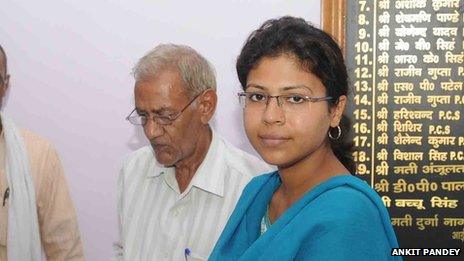Indian media: Official's 'controversial' suspension
- Published

Durga Shakti Nagpal (right) is known for taking a tough stand against corruption
Media in India are highlighting the "controversial" suspension of a female civil servant in the northern state of Uttar Pradesh.
The state government suspended Durga Shakti Nagpal on 27 July, saying she approved the demolition of a mosque wall in Gautam Buddh Nagar district "without following the due process", The Tribune, external reports.
Facing "intense criticism" over the issue, Chief Minister Akhilesh Yadav "vehemently" justified the suspension, blaming the 28-year-old officer "for mishandling a situation that could have led to communal tension".
But the decision has not gone down well with some of her senior colleagues and the media, who feel the officer was suspended for taking a tough stand against the local sand mining mafia.
"Already there's outrage among people who believe that Ms Nagpal was suspended for taking on a powerful vested interest, the sand mining mafia, and not for the reason proffered by the government," The Times of India, external reports.
The paper adds that the issue has "escalated into an extraordinary nationwide protest" with thousands of civil servants criticising the "unfair treatment meted out to a young, honest bureaucrat".
"If Mr Yadav is to survive this incident unscathed, he must demonstrate political acumen and reinstate Ms Nagpal," says The Hindu, external.
Rare political unity
In a "rare show of unity", political parties seem to be united against the recent Supreme Court judgments that barred jailed politicians from contesting polls and sought immediate disqualification of those convicted, reports say.
The developments could lead to a "fresh round of hostilities between the legislature and judiciary", which have a "history of clashes", The Hindustan Times, external reports.
The parties "expressed concern over erosion of supremacy of parliament" after the court order on contesting polls among other issues, The Pioneer, external quoted Parliamentary Affairs Minister Kamal Nath as saying.
Meanwhile, the cabinet has cleared a proposal to amend the Right to Information (RTI) Act to keep political parties out of the legislation's ambit.
The RTI law allows Indians to access information held by the government.
The Tribune, external feels the move will keep the "source of funding of political outfits under wraps".
In June, India's transparency watchdog had declared that political parties would be brought under the RTI.
Meanwhile, the Delhi police have apologised and removed a controversial advertisement which many saw as "insulting" to impoverished children, the Times Now, external website reports.
"Help him learn how to chop an onion, before someone teaches him how to chop a head," the advertisement's "provocative" tagline read, reports the NDTV, external website.
The Delhi Police Yuva Foundation, which had put out the advertisement to raise funds for their youth training programme, faced a "flood of outrage and adverse reactions on the social media", the website added.
'Scripting history'
In sports, India "scripted history" as the junior girls team stunned higher-ranked Spain 4-2 to enter the semi-finals of the Women's Junior Hockey World Cup for the first time, The Indian Express, external reports.
The girls "dished out a spirited performance to tame their higher-rated opponents and seal a last-four berth for the first time in the history of the event", the report adds.
Another group of teenage girls from a small village in the eastern state of Jharkhand made many Indians proud by securing the third position among 10 teams playing for the Gasteiz Cup in Victoria Gasteiz in Spain, The Hindu, external reports.
The 18 tribal girls representing the Yuwa (youth) India under-14 team "achieved something that sportspersons with the best facilities and support in cities often aspire for but don't always succeed", the paper adds
And finally, Indian cricket team defeated hosts Zimbabwe by nine wickets on Thursday to take an unbeatable 4-0 lead in the five-match series, reports the cricketnext.com, external website.
BBC Monitoring, external reports and analyses news from TV, radio, web and print media around the world. For more reports from BBC Monitoring, click here. You can follow BBC Monitoring on Twitter , externaland Facebook, external.